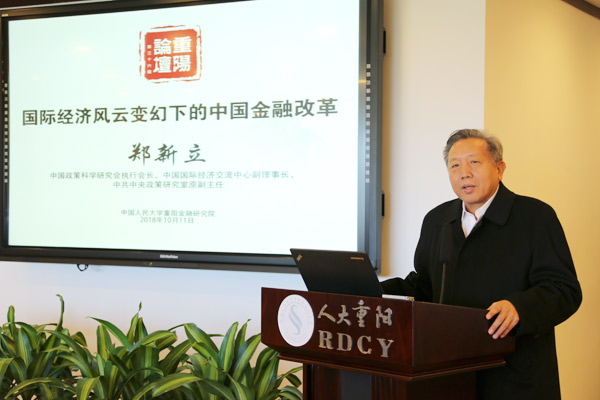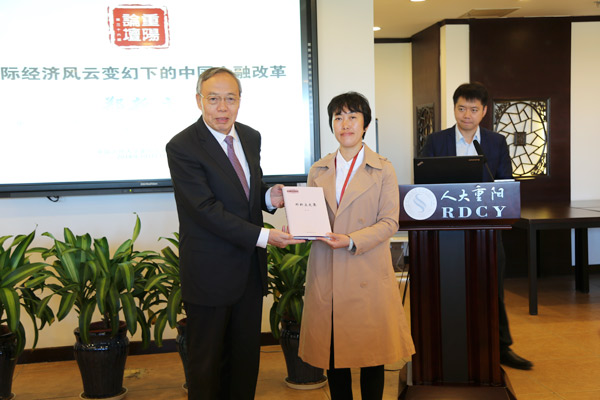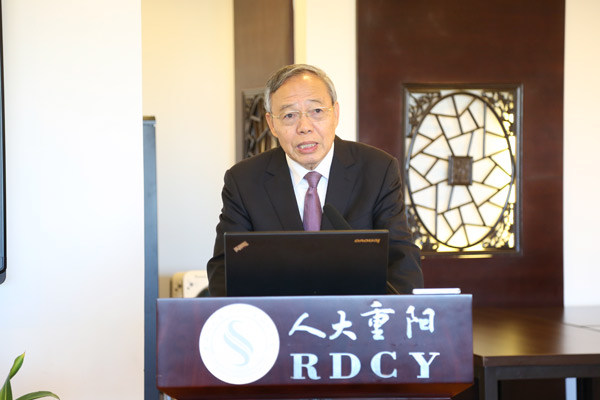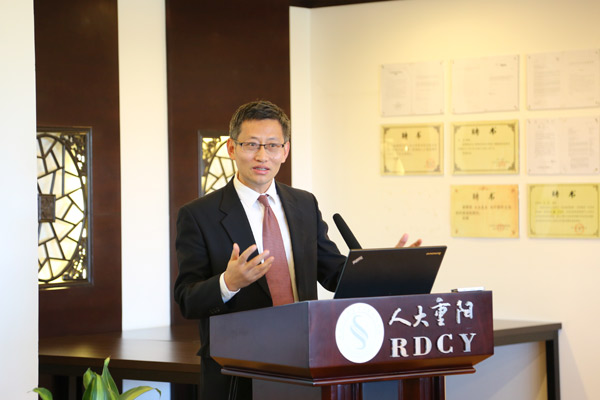Picture
Your Present Location: HOME> PictureZheng Xinli: Expanding domestic demand is fundamental measure to narrow Sino-US gap
On the morning of October 11, the 36th RDCY Forum invited Zheng Xinli, former deputy director of the Policy Research Office of the CPC Central Committee and executive director of China Association Of Policy Science, to deliver a lecture at the Chongyang Institute for Financial Studies of Renmin University of China (RDCY), with the theme of China's financial reform under the changing international economic situation. Nearly 100 participants attended the forum.

Wu Xiaoqiu delivered a speech
This Forum was presided over by Wang Wen, Executive Dean of RDCY. Wu Xiaoqiu, vice president of Renmin University of China (RUC), delivered a speech firstly. He said that modern financial system is a market-oriented, technological, and international finance. Financial reform is a very important and complex field in China's financial modernization, and promoting China's financial market-oriented reform and internationalization are very important for building a big country finance that matches the status of China in the world.

RUC Library accepts the donation of director Zheng Xinli
Before his lecture, director Zheng Xinli presented the "Zheng Xinli Corpus" (full 16 volumes, China Social Science Press, 2016) to the Library of RUC and RDCY. Ms. Zhu Xiaojing, deputy director of the Library, and Hu Haibin, assistant to the dean of the RDCY, accepted the donation.
Then, director Zheng Xinli delivered a speech. He pointed out that China's financial reform depends on expanding domestic demand to narrow the gap with the United States. The main contradiction in current Chinese economy derives from the sluggish demand.

Zheng Xinli
Zheng stated that China's financial reform should focus on the following five aspects: First, promote domestic demand and meet the challenge of the United States on containing China's development.
Second, expand direct financing and make the stock market play the normal functions of discovering valuable enterprise, financing and distributing the profit (revenue). To realize these functions, it is necessary to change the approval system into a record system, strengthen supervision over the stock market, and accomplish the asset securitization. in addition, reducing debt ratios by ensuring a replenishment of capital and stimulating private investment to enhance economic vitality.
Third, curb the rising housing price. Zheng disapproved of suppressing the rising of housing prices by tightening monetary policy. He said that China should establish a real estate market integrating urban and rural areas, break the urban-rural dual structure so as to increase supply and solve the problem of excessive housing prices.
Fourth, activate the capitalization of rural land to realize rural revitalization. by integrating the agricultural modernization, new rural construction, urbanization of migrant workers and construction of characteristic towns, we can promote the overall development of rural areas. At the same time, we need to find the new source of funds to revitalize the land resources.
Fifth, explore the establishment of an international monetary system with three pillars of the US dollar, the euro, and the renminbi, thereby forcing the governments of the countries in which the international reserve currency is issued to be responsible for the stability of their currencies and maintaining the stability of international finance.

Chen Zhongyang
After the speech, Chen Zhongyang, a professor at the School of Finance of RUC, gave his comment on Zheng’s speech. Professor Chen Zhongyang affirmed director Zheng Xinli's views on real estate reform, rural development, state-owned enterprise asset securitization and direct financing development. As a scholar in the study of risk management, Professor Chen added that Chinese enterprises, financial institutions and local governments should establish better risk identification and management capabilities in the future development.
Finally, director Zheng responded to the questions from the audience and media, and the lecture ended in a warm atmosphere.























































































 京公网安备 11010802037854号
京公网安备 11010802037854号





